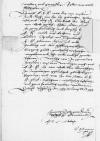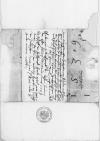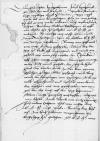Letter #4927
Ioannes DANTISCUS to Albrecht I von Hohenzollern-AnsbachSeeburg (Jeziorany), 1539-01-29
| received Königsberg (Królewiec), 1539-01-31 Manuscript sources:
Auxiliary sources:
Prints:
| ||||||||||||
Text & apparatus & commentary Plain text Text & commentary Text & apparatus
 GStA PK, HBA, C1, No 542 3 unnumbered
GStA PK, HBA, C1, No 542 3 unnumbered
Dem durchlauchten, hochgebornen fursten und hern, hern
 GStA PK, HBA, C1, No 542 1 unnumbered
GStA PK, HBA, C1, No 542 1 unnumbered
Durchlauchter, hochgeborner furst, hochgunstiger, lyber her und freundt. / Unsere freuntliche, wÿllige dinst zuvoran. /
Wÿ negst unser bot von konniglichem hove an uns gelangt, / so hat er uns under andren / auch unsers freuntlichen bruders
Aus andern orthern hab wir nichts, das E(wer) F(urstliche) D(urchlauch)t nicht wuste, / nemlich das  GStA PK, HBA, C1, No 542 2 unnumbered weÿtters und gewÿssers, / bÿtten uns woldt mÿttheÿlen / etc.
GStA PK, HBA, C1, No 542 2 unnumbered weÿtters und gewÿssers, / bÿtten uns woldt mÿttheÿlen / etc.
Dyweÿl E(wer) F(urstliche) D(urchlauch)t weis, das wir unserm(m) stande nach / vor dÿ, / dÿ gebrochen haben, / Got / und auch dÿ obrikeÿtt der menschen paper damaged⌈[hen]hen paper damaged⌉ von Gotte gesatzt, / bytten sollen, / so ÿst un paper damaged⌈[un]un paper damaged⌉ser gantz freuntlich und fleÿssig begehren, E(wer) paper damaged⌈[gehren, E(wer)]gehren, E(wer) paper damaged⌉, F(urstliche) D(urchlauch)t wolde un(n)s erhören und [...] paper damaged⌈[...][...] paper damaged⌉ erbarn
Datum(m)
ill(ustrissi)mae d(ominatio)nis v(est)rae deditissi(m)us
Io(anne)s ep(iscop)us


